Community Helper - Support for Elders with Emigrant Family
Helping the Elderly Adapt to Changes and Enhancing Quality of Life
When she learnt that her eldest son would emigrate in a month or so, Maggie, a singleton elder in her 70s, did not know how to deal with it. As she counted down the days until her son’s departure, she tried to create more memories - she wanted to eat his hand-cooked meals in the hope of retaining the memories of her son. But three years on, the feeling of absence is still there. ‘Maggie was the first batch of service users when the project started in August 2023, and I still remember that she was in tears when we met for the first time.’ Annie Shum, the responsible social worker of the ‘Community Helper - Support for Elders with Emigrant Family,’ said, ‘Fortunately, Maggie met other people in the same boat through the project. They comforted each other and found empathy. And Maggie opened her heart.’
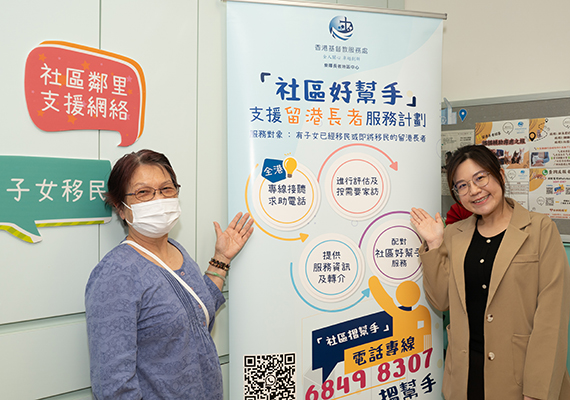
From suffering in silence to opening up
Maggie is a hard-working mother who worked hard for her four children when she was young. But she never talks about her physical pain. ‘I started suffering from sciatica when I was in my 20s, and the pain was so intense that it burnt my whole body.’ She has lived with pain for over 50 years and taken medicine to relieve the pain. She thought of having an operation, but due to the high risk involved, she would rather endure it for a while and continue working and caring for children. Because of her pain, Maggie said she often kept a straight face, and because she was not good at communication, her parent-child relationship was never perfect. More than a decade ago, when her eldest daughter was admitted to hospital, Maggie stayed with her for a year and took good care of her. Not only was her eldest daughter moved, but the other three children were also touched. The relationship that had been frozen for many years finally melted.
In her seventies, Maggie reestablished her parent-child relationship with her two daughters and two sons and traveled together from time to time. ‘Before the pandemic, I traveled with them three times a year. Last Lunar New Year I just finished traveling to Korea with my eldest daughter and her family,’ Maggie grinned. ‘I don’t want to go traveling with them anymore.’ She explained that after that trip, she felt overwhelmed and feared being too slow to hinder their journey. ‘Unless I can travel with my eldest son.’ Maggie’s eldest son emigrated to the UK in 2020, and in the meantime, the two of them have been in touch by phone, but the longing for each other has been buried in their hearts.
Maggie has been in the project for half a year and has made friends with those share a fellow feeling. Sharing stories and feelings help her to feel relieved: ‘I can say that I’m “bursting” with happiness now. Sometimes, when I hear people complaining about their problems, I think that my situation is not the worst, and sometimes, when I listen to people sharing happy stories, I feel so glad for them.’ Annie said the elderly with emigrant family have similar experiences and feel secure to share to each other their feelings.
Maggie and her children met via a video call during the Chinese New Year. ‘My eldest son said he will go traveling with us after he arranged his work,’ she laughed and looked forward to the reunion.
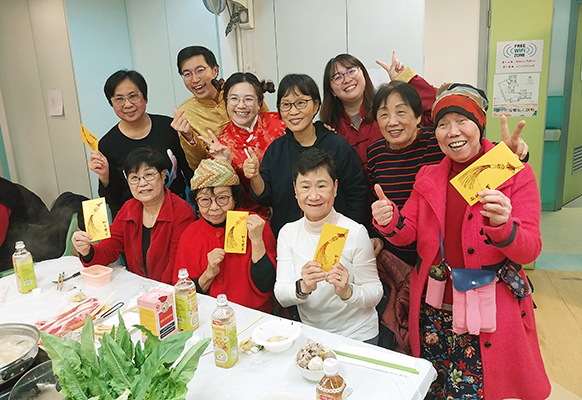
The elders had a reunion dinner at Chinese New Years’s Eve, enjoying the warmth of companionship.
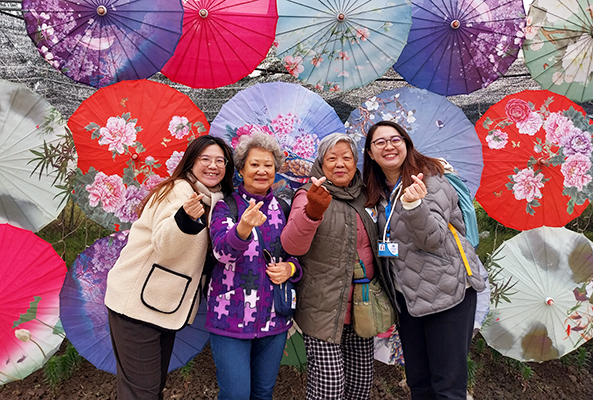
The elders took selfies after enjoying 'basin vegetables' during the Winter Solstice.
Strengthening community and neighbourhood support networks
In recent years, some Hong Kong families emigrated overseas without their elderly family members for different reasons. Therefore, HKCS conducted a survey from November 2022 to February 2023 and found that nearly 40% of the respondents had children who emigrated in 2020 or after, and over 60% emigrated children were their ‘primary caregivers’. Nearly 80% of elders with emigrant children are at ‘high risk’ of social isolation, and almost 70% were prone to depression. Given this, we launched this project in August 2023 to strengthen the connection of elders with emigrated family with community support services, to understand their needs, and to match them with appropriate services to help them adapt to the changes in their lives and to enhance their quality of life.
Over 150 elderly people have registered since this project launched seven months ago. Among them the average age was 75 and the oldest aged 92, mainly living in Kwun Tong and Shamshuipo districts. ‘They are supportive of our activities, some of which were full within a few hours of publicity,’ Annie laughed. ‘The elders have become good friends, established mutual support networks, cared for each other, and even organised activities on their initiative, which is the most successful aspect of this project. For example, some smart elders, who know where to get free tickets for Cantonese Opera, will invite the others to go enjoy the show.’
The project has organised a wide range of activities, including festive celebrations, interest classes, life skills classes, and more. For instance, over 60 people had a reunion dinner in the latest Lunar New Year. ‘It was organised by our service users, some of them were responsible for food preparation, such as making dumplings, while we prepared the ingredients for them and publicised the recruitment,’ Annie said. Many elders used to prepare reunion dinner for their family members, but they stop doing this after their children have emigrated. ‘Now there are people who appreciate their dumplings again and they feel the warmth of companionship,’ she said.
Elderly volunteering and more public education
Speaking of the challenges faced by the project, Annie said more volunteers are needed. ‘At present, we have more than ten trained volunteers to help with outreach services, but the number is not enough.’ Annie said that, on average, one to two elders register every working day, and some emigrant children have even come forward to apply for the service for their ‘hidden’ parents. ‘There are many enthusiastic volunteers, but most of them are working people who can only receive training or visit the elderly in their spare time, so most of them cannot be matched with the service users,’ Annie said. She explained that the project has to ensure the quality of volunteers, and the volunteers need to invest time to build up mutual trust, which is ultimately to protect service users.
Apart from visiting the elders and teaching them life skills, the project also needs manpower to organise large-scale activities. Annie said, ‘We hope our service users can turn into volunteers and organise activities together. In fact, each of the service users has their skills. Maggie, for example, has 20 years of experience teaching swimming. There is even a coach of the Hong Kong Table Tennis Team. Each of them has skills and wisdom. If they can learn independently and share, they can build a closer support network,’ she said. She also cited the example that when some elders have dealt with the emotions of being separated from their children, they can help other elders learn to face and prepare for it, such as telling them what migration is all about, what the situation is like in foreign countries, how to communicate with their children, and more.
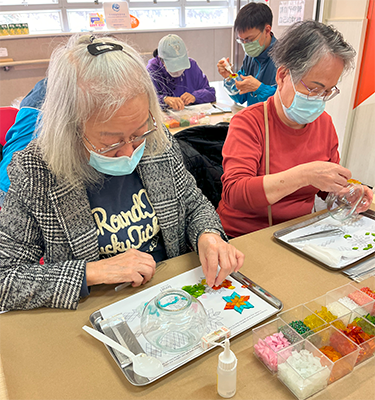
Young Volunteers and the elders made Turkish lamps together and showed their creativity.
Looking ahead, Annie hoped to organise more public education programmes for families planning to emigrate so that they can prepare and communicate with their elders as early as possible. ‘We have found that very often, there are misunderstandings between the two generations, and that is why people are overly worried. For example, some elders have no idea about emigration but are afraid to ask questions for fear of adding to the burden of their children and ultimately affecting their health. As for children who intend to emigrate, especially those who have been taking care of their parents, they often do not know how to tell the elders and make arrangements due to a sense of guilt. If there is better communication between children and parents, both will be better off.’
No matter what families plan to do, family communication is always essential to the solution. We hope this project can help more needy families and elders to have a better life.
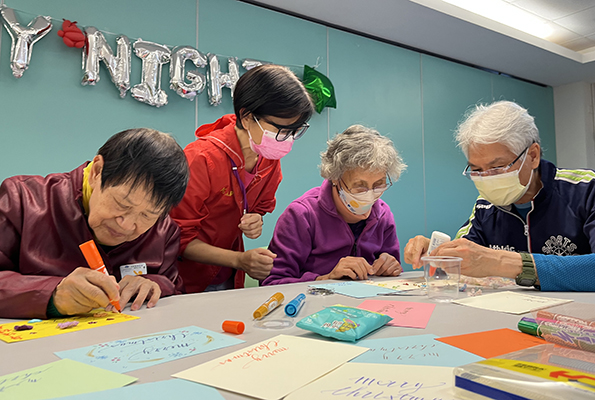
Learning Western calligraphy at a Christmas party and completing a unique Christmas card in the company of volunteers.








